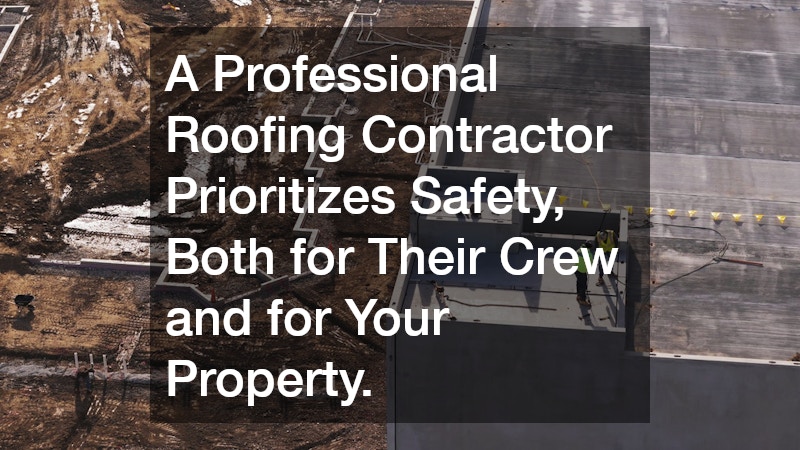Hiring a roofing contractor is an important step toward protecting your home and ensuring the longevity of your roof. Whether you’re scheduling a full replacement, a repair, or a routine inspection, a little preparation before the visit can make the process smoother and more efficient. Knowing what to expect and how to get ready will help your roofing contractor complete the job safely and effectively while minimizing disruptions to your daily life.
Clear the Work Area
Before your roofing contractor arrives, it’s essential to clear the area around your home. Remove vehicles from the driveway and move outdoor furniture, grills, toys, and decorations away from the work zone.
Roofing projects often involve ladders, heavy materials, and debris, so creating a clear perimeter helps workers access your roof easily and safely.
If you have landscaping or garden features near your home, cover them with tarps or protective sheeting to prevent damage from falling shingles or nails. Most professional contractors take precautions to protect your property, but preparing in advance adds an extra layer of safety.
Secure the Inside of Your Home
Roofing work can cause vibrations throughout your home, especially during tear-offs or hammering. To avoid accidents, remove fragile items from walls and shelves, such as picture frames, mirrors, and glass decorations. If you have an attic, cover any stored items with a tarp or sheet to protect them from dust and debris that may fall through during the project.
You should also consider securing light fixtures or ceiling fans if your home’s structure allows movement between the roof and ceiling. While it’s rare for anything to come loose, it’s better to take preventive measures before work begins.
Communicate with Your Contractor
Good communication is key to a successful roofing project. Before the scheduled visit, discuss the scope of work, estimated timeline, and any specific requests or concerns you may have. Confirm what time the crew will arrive and how long they expect to be on-site.
Ask your roofing contractor about noise levels, access needs, and any safety guidelines you should follow during the project. You can also inquire about cleanup procedures and waste disposal, as some companies bring their own dumpsters while others arrange separate removal.
If you have pets or young children, it’s wise to plan ahead. Loud noises and strangers around the property can be stressful for animals or disruptive for kids, so consider keeping them indoors or arranging temporary care elsewhere during working hours.
Check for Access Points
Roofing contractors need easy access to your roof and power sources. Make sure gates are unlocked, and provide clear instructions if your property has security systems or restricted areas. If your electrical outlets are located outdoors, confirm that they are functional for use with tools or equipment.
For multi-story homes or homes with limited yard space, inform the contractor of any obstacles like fences, trees, or uneven terrain that might affect ladder placement. This allows them to bring the right equipment and avoid delays once work begins.
Protect Your Belongings and Property
Roofing projects can generate a significant amount of debris. Nails, shingles, and small materials often fall from the roof during removal or installation. While most contractors use tarps and magnetic sweepers to collect debris, it’s still a good idea to take extra precautions.
Move patio furniture and potted plants away from the sides of your home. If possible, park your car on the street to prevent damage from falling materials. Cover outdoor air conditioning units or delicate landscaping features with plywood or thick plastic.
Inside your home, close windows and doors to minimize dust and noise. You might also consider notifying your neighbors, especially if you live in close proximity. A quick heads-up helps maintain good relationships and prepares them for potential noise or temporary parking inconveniences.
Understand the Project Timeline
Knowing what to expect in terms of duration helps you plan accordingly. A standard roof replacement can take anywhere from one to three days, depending on the size of your roof and weather conditions. Repairs or inspections typically require less time, but it’s still best to clarify the schedule in advance.
Your roofing contractor can provide an estimated start and completion time and notify you of any potential delays due to rain, wind, or material availability. Being flexible with the schedule ensures the project is completed safely and to the highest quality standards.
Review Safety and Cleanup Procedures
A professional roofing contractor prioritizes safety, both for their crew and for your property. Before the project begins, ask about safety measures such as harness use, ladder protocols, and debris management. You should also confirm how the cleanup will be handled. Many contractors perform a full sweep of your yard and driveway after completion, removing all nails, shingles, and construction materials.
Once the work is done, schedule a walkthrough with the contractor to inspect the results. This is the best time to ask questions, review warranties, and ensure all expectations were met.
Preparing for your roofing contractor’s visit takes a little time but pays off in smoother communication, fewer disruptions, and better project results. By clearing the area, securing valuables, planning for safety, and maintaining open dialogue, you set the stage for a successful roofing experience. A well-prepared homeowner not only helps the contractor work more efficiently but also ensures the finished product enhances the home’s protection and appearance for years to come.




